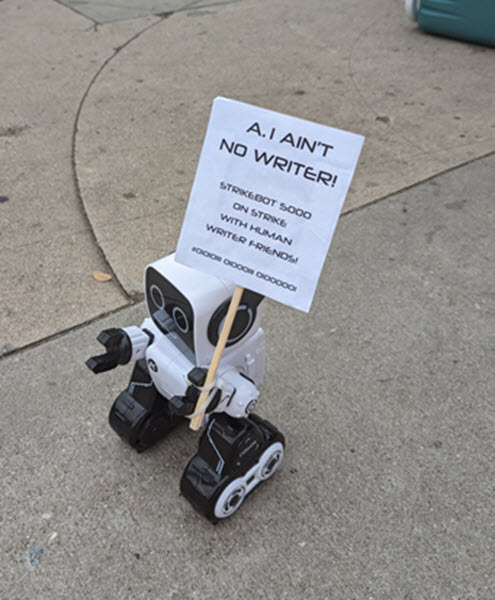|
One of the notable issues in the WGA and SAG-AFTRA strike against the AMPTP companies is the use of artificial intelligence in the Industry. It’s a substantial concern for writers and actors alike.
That's why I quickly sat up when a news item caught my eye on Friday, though it seemed to fall through the cracks and didn't get much coverage for how it relates to the strike. Perhaps it’s because it appeared on a Friday afternoon, when most people’s focus is elsewhere. Maybe it’s because in Los Angeles people were putting more attention on Hurricane Hilary headed our way. But -- it seems a significant story that could have impact on the strike...and the future of filmmaking. The story is that on Friday, a federal judge upheld a U.S. Copyright Office ruling that a work of art which is created by artificial intelligence is not open to copyright protection. U.S. District Judge Beryl Howell ruled that copyright law has “never stretched so far” to “protect works generated by new forms of technology operating absent any guiding human hand.” That’s pretty blunt, but one other particular sentence in the judge’s opinion stood out even more – “Human authorship is a bedrock requirement.” A concept that she said “rests on centuries of settled understanding.” All this would seem to be a major roadblock to studios who (much to the long-chagrin of writers) hold the copyright on the works that they paid for, but did not create. More to the point, studios have historically gone to great lengths to protect those copyrights. If the use of AI in making those films and TV shows and series would render the copyrights on those works moot, it would seem that using AI in them would be the last thing a company would want to try. But the judge went even farther, in great detail, writing that the very purpose of copyright law is to encourage “human individuals to engage in” creation. She explained that when copyrights and patents were established “it was understood that recognizing exclusive rights in that property would further the public good by incentivizing individuals to create and invent.” She added even more pointedly that “The act of human creation — and how to best encourage human individuals to engage in that creation, and thereby promote science and the useful arts — was thus central to American copyright from its very inception.” Judge Powell even focused on technology itself, indeed on entities that are not human, writing how “Non-human actors need no incentivization with the promise of exclusive rights under United States law, and copyright was therefore not designed to reach them. Finally, another passage in her ruling underscores all this still more, even when recognizing how the world and the needs of the law has changed. She wrote, “The understanding that ‘authorship’ is synonymous with human creation has persisted even as the copyright law has otherwise evolved.” For those interested in such things, you can read the full court ruling here. To be clear, as pointed as Judge Howell’s ruling was, the issue of AI isn’t as completely simple as that. Though the foundational substance is. Back in March, the copyright office ruling that was the foundation of the court challenge being filed, had that stated that most AI-generated works are not copyrightable – however, they left open that, under some conditions, works that used AI-assisted materials could qualify for copyright protection. They said that if a work was created along with the additional help of artificial intelligence, copyright could possibly be granted if it was shown that a human “selected or arranged” the work in a “sufficiently creative way that the resulting work constitutes an original work of authorship.” That said, though this position of the Copyright Office does leave open the use of some AI in copyrighted work, it still would require the “substantially creative” involvement of a human. So, general, random material couldn’t just be fed into AI software and claim copyright. The creative process of a writer or actor who specifically “selected or arranged” the material would be needed. Which, in many ways, would defeat the purpose of a studio using AI to cut writers or actors out of the process to save money. Wiser legal minds than mine will be arguing this in the near future, and beyond. But it would none-the-less seem with such legal phrases as, “Human authorship is a bedrock requirement” and that this is a concept that “rests on centuries of settled understanding,” those would appear to be high hurdles that should terrify studios that live and breathe on the existence of copyright when trying to justify the unbridled use of artificial intelligence as the hill during a strike they want to die on.
0 Comments
Leave a Reply. |
AuthorRobert J. Elisberg is a political commentator, screenwriter, novelist, tech writer and also some other things that I just tend to keep forgetting. Feedspot Badge of Honor
Categories
All
|
|
© Copyright Robert J. Elisberg 2024
|







 RSS Feed
RSS Feed